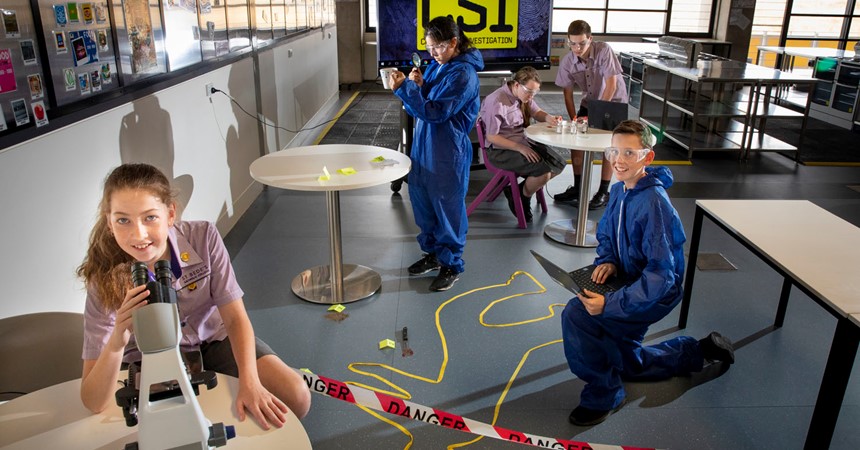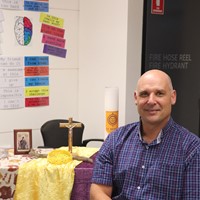Learning at St Bede’s evolved from the initial educational brief that informed the architectural design of the school and guided the work of principal, John Murphy, and his management team.
The challenge from the very beginning was to develop a pedagogical approach that would be innovative, exciting and enriching within a flexible learning environment. Learning spaces were to consist of different zones, including teacher instruction, collaboration and creative group work, and independent study.
A variety of furniture in these spaces and the use of digital technology have helped teachers and students adapt to an evolving contemporary pedagogical model of learning. This model supports personalised learning through identifying students’ strengths and capabilities. The key to the successful implementation of this contemporary pedagogical approach has been the recruitment and induction of a passionate, committed staff.
In its foundation year in 2018, St Bede’s commenced with 108 enthusiastic Year 7 students and a small but united staff. During Stage 1, teaching and learning took place in the demountable block known as the “flexible learning village” (FLV), which consisted of a large general-purpose learning area, and another large open space, each with its own furniture. These spaces catered to individual classes or clusters of up to 60 students with two staff. Students were timetabled into cluster groups — combining Mathematics with Science and HSIE with English.
Co-teaching is a skill that requires clear communication between teachers and constant evaluation. Cross-curricular teaching and learning has been just one means to engaging the students within real-world contexts and improving literacy and numeracy skills. This is a priority of the St Bede’s Learning and Wellbeing Framework launched in 2019.
The Learning and Wellbeing Framework brings together five essential elements for quality learning and wellbeing under the one umbrella. Rich and personalised learning is created through quality, and relevant assessment designed to provide meaningful feedback. Over the past two years, we have developed tasks across Human Society and Its Environment (HSIE)/English/Music, and Science/Mathematics/Technical and Applied Studies (TAS).
In Term 3 2019, St Bede’s launched a cross-curricular task involving all Year 7 key learning areas. This cross-curricular assessment approach reduced the number of tasks given to students, therefore reducing the overwhelming feeling students can encounter when presented with multiple tasks and due dates. These tasks came under the concept of “Identity”. The entire Year 7 cohort was taken offline for the day to experience and unpack two major tasks:
“Identitatem Projectus Horribilus” — HSIE/English/Music
Students were to create a Horrible History episode where they designed a script and storyboard to assist in filming their documentary. They were also required to compose incidental and thematic music to accompany their episode.
CSI Chisholm — TAS, Mathematics and Science
This task, “The Case of the Mystery Bone” was innovative and exciting for students to solve. Students became forensic scientists investigating a crime scene and processing evidence to find out “who done it”. CSI Chisholm was presented at the Sydney University STEM Academy Conference. The project was highly acclaimed, and St Bede’s was invited to present at the university.
Year 8 “Water in the World” — HSIE, English, Science
This creative and real-life project allowed Year 8 students to cross over into Geography, Religious Studies, English, and STEM curriculum content. Students developed their own innovative solution to improving sustainable water use in a project conducted in conjunction with Hunter Water. Several students’ solutions were recognised, both through attendance at the Hunter Water Expo (and 15 seconds of fame on NBN news), as well as winning accolades at the Hunter Young Business Minds Awards.
Year 7 “Livability Project” — HSIE and English
In its second year, the “Liveability Project” brought together the skills of persuasion from English with the knowledge and content of Geography in Place and Liveability. After a presentation by AVID, Chisholm’s Waterford Harvest developers, students researched and pitched a proposed improvement to their suburb’s liveability.
Maths Pathway
As our Mathematics and Science classes are clustered, this new program will allow greater scope on personalised learning. Students will have the opportunity to become more independent learners and gain a better insight into their strengths and weaknesses in mathematical skills and content.
Future of St Bede’s and cross-KLA
Planning for this year and Stage 5 is almost complete. Staff are excited to create engaging learning opportunities for our students.
Teaching and learning at St Bede’s is not limited to integrated teaching and cross-curricular tasks. Subject-specific instruction and enquiry are also equally important, but crucially we are teaching our students the necessary skills for this century — collaboration, creativity, critical thinking and communication.
Future growth and development at St Bede’s involve the continued implementation of the Learning and Wellbeing Framework in guiding practices and planning, particularly in improving cross-curricular work.




























































































